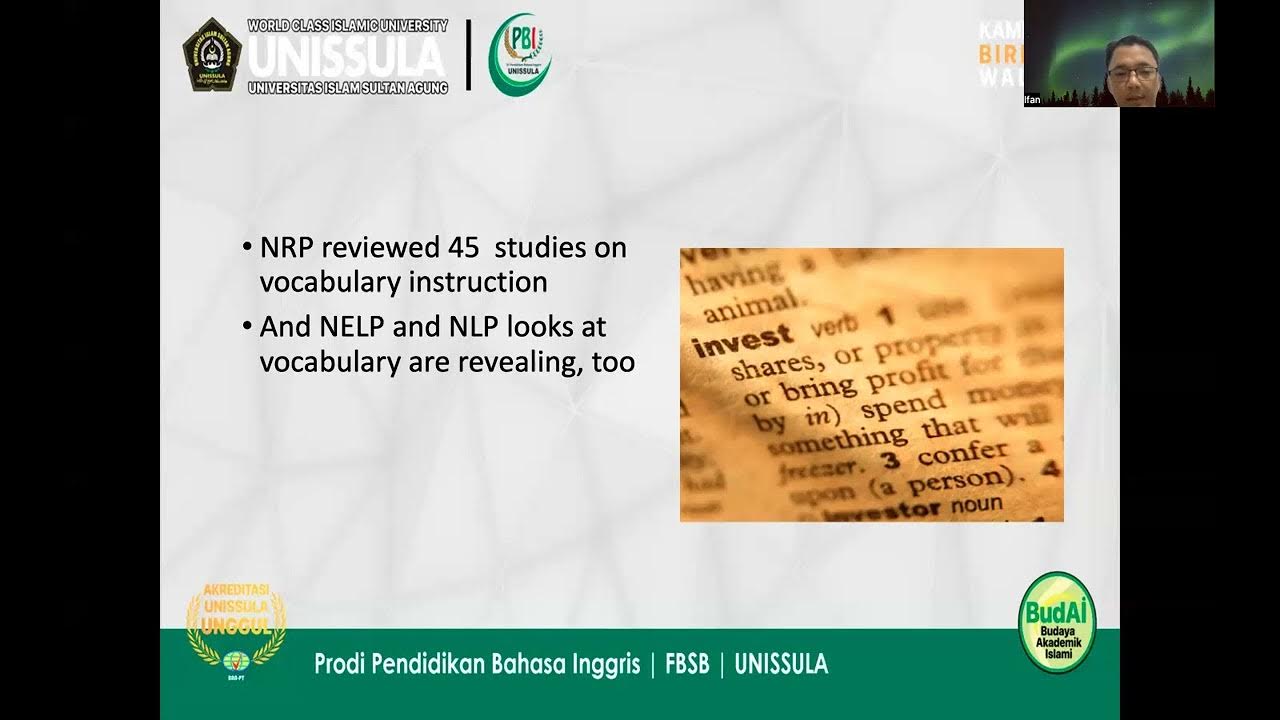#testing #listening #machung Testing Listening Comprehension
Summary
TLDRThis lecture focuses on testing listening comprehension, emphasizing its complexity and the cognitive skills required. The speaker explains different types of listening comprehension tasks, such as testing discrete elements of language, responding to limited questions, following instructions, and understanding both detailed and global information from longer speeches. Various test formats, including multiple choice, short answers, dictation, and essays, are discussed as effective ways to assess listening skills. The goal is to enhance students' ability to listen and retain information, simulating real-life academic situations.
Takeaways
- 😀 Listening comprehension is a complex skill that requires both auditory and cognitive abilities.
- 😀 Unlike written text, spoken language is fleeting, meaning it exists only for a short time before it disappears.
- 😀 Effective listening comprehension relies on connecting information to long-term memory and being able to reproduce it when necessary.
- 😀 One way to test listening comprehension is through discrete element testing, where listeners distinguish subtle differences in sounds, like 'fast' vs. 'vast'.
- 😀 Limited response tests evaluate the ability to listen to short questions and provide brief answers, like responding to 'Where are you from?'
- 😀 Instruction comprehension tests focus on the ability to follow oral instructions, such as drawing or coloring based on spoken directions.
- 😀 Comprehension tests with longer speeches require the listener to recall specific details, such as the time of an event or weather forecast.
- 😀 Global comprehension tests assess the listener's understanding of the main ideas in a long speech or lecture, often through summarizing or identifying key concepts.
- 😀 In academic settings, students may need to listen to lectures, take notes, and then summarize the information in their own words.
- 😀 Common formats for testing listening comprehension include multiple choice, short answer, dictation, and short essay responses.
Q & A
Why is listening comprehension considered a complex skill?
-Listening comprehension is complex because sound is fleeting, meaning it only exists for a brief moment before it disappears. Unlike written text, which is permanent and can be revisited, oral input requires immediate processing and cognitive engagement to retain and understand.
What role do cognitive skills play in listening comprehension?
-Cognitive skills are crucial because listeners need to actively process and connect the spoken input to their long-term memory. This helps in remembering the information and reproducing it when necessary.
What is the difference between listening and reading in terms of permanence?
-Listening involves sound, which is fleeting and disappears after a fraction of a second. In contrast, reading involves written text, which is permanent and can be revisited multiple times.
What does testing discrete elements of language involve?
-Testing discrete elements of language focuses on assessing the listener's ability to distinguish small, separate elements, such as sounds. For example, identifying the difference between words like 'fast' and 'vast' based on sound.
What is an example of testing for limited responses in listening comprehension?
-An example of testing for limited responses is when a tester asks short, specific questions like 'Where are you from?' and the test taker is expected to provide a brief answer, such as 'Indonesia.'
How is instruction comprehension tested in listening assessments?
-Instruction comprehension is tested by asking the listener to follow a sequence of spoken instructions, such as 'Draw a circle on the center of the page, then draw a smaller circle beside it and cover it with red.' The test taker must carry out the instructions based on what they hear.
What does testing for detailed comprehension involve?
-Testing for detailed comprehension involves listening to longer speeches or passages, like a weather forecast, and answering questions about specific details mentioned in the speech, such as 'When will it rain today?'
How does global comprehension differ from detailed comprehension in listening tests?
-Global comprehension tests assess the ability to grasp the main ideas and key details from a longer speech or lecture. This is different from detailed comprehension, which focuses on specific information or facts within the speech.
What are some common formats for testing listening comprehension?
-Common formats include multiple-choice questions, short-answer responses, dictation tasks, drawing or filling out forms, and short essay responses. These formats test various levels of listening skills, from basic details to more complex summaries.
How do listening comprehension tests simulate real-world academic scenarios?
-Listening comprehension tests, especially those requiring note-taking and summarizing a lecture, simulate real-world academic tasks where students must listen to a lecture, take notes, and answer questions based on the content, mimicking what is required in university settings.
Outlines

This section is available to paid users only. Please upgrade to access this part.
Upgrade NowMindmap

This section is available to paid users only. Please upgrade to access this part.
Upgrade NowKeywords

This section is available to paid users only. Please upgrade to access this part.
Upgrade NowHighlights

This section is available to paid users only. Please upgrade to access this part.
Upgrade NowTranscripts

This section is available to paid users only. Please upgrade to access this part.
Upgrade Now5.0 / 5 (0 votes)





